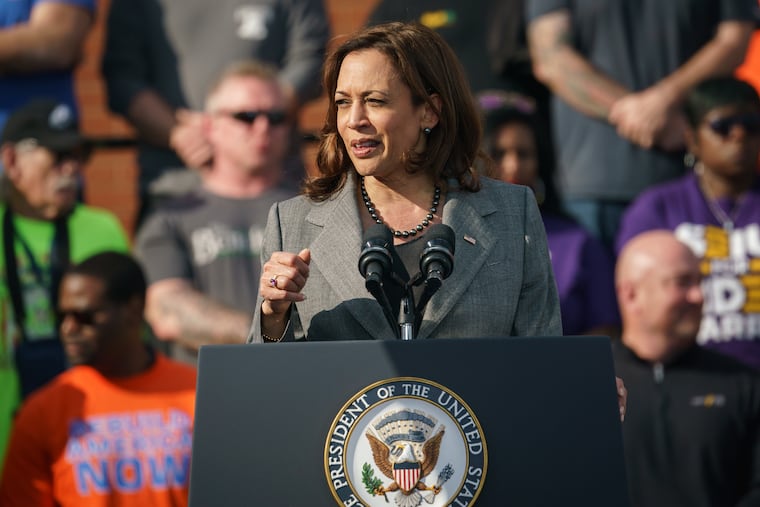Vice President Kamala Harris on unions in Philly, inflation, and the midterm elections
We spoke with the vice president about a new White House labor task force, legislation to make it easier for workers to unionize, and more as she visited Philadelphia.

Vice President Kamala Harris met with Philadelphia labor leaders Tuesday and rallied with union workers, touting the administration’s legislative and regulatory push to support organized labor.
The Inquirer spoke to Harris about a new White House labor task force, diversifying Philadelphia’s unionized workforce, and legislation known as the PRO Act that labor leaders say makes it easier for workers to unionize. We also asked her about inflation and her message to Pennsylvania voters ahead of the midterm elections.
This interview has been lightly edited for clarity and brevity.
The Inquirer: A lot of union leaders here say major labor reform has to come through legislation. What is the Biden administration doing to move the PRO Act forward?
Harris: “The president and I feel very strongly that if we are going to build America for the future in a way that we are prepared to meet the challenges, but also to continue to strengthen our country, we have to strengthen labor unions.
“I head up the labor council for the administration. We worked for an entire year on building up recommendations — 70 — for the president, who ultimately accepted the recommendations, about what we can do with one of the largest workforces in the country, which is the federal workforce, to ensure that we support collective bargaining rights and that we allow workers to organize.
“We of course support the PRO Act. And it is because, again, we believe very strongly, and I believe very strongly, that if we are going to support workers, if we’re going to support their productivity, we should support collective bargaining. We should support their ability to organize.
“Look at what we have accomplished with the bipartisan infrastructure law. We’re going to be putting billions of dollars, which is already starting to flow, into building back up roads and bridges. All of that work ... will require union labor, who are some of the highest skilled of the workforce.”
In Philadelphia, there’s long been a struggle to diversify the building trades, in particular. How are you thinking about equity and ensuring there’s a level playing field?
“It’s one of the highest priorities and is something we actually brought up in the meeting [with local labor leaders]. And what I’m happy to hear is that I think that organized labor around the country ... really do recognize that there has to be greater diversity, both in terms of race and in terms of gender.
“And what I’ve been very pleased to see is that labor leaders around the country are actually proactively working on that, understanding again that there’s a lot of work to be done and a lot of very capable folks.”
» READ MORE: How small businesses should prepare for union-boosting legislation in Washington
When might Philadelphians see some relief at the pump and at the grocery store, and why has inflation been so hard to control?
“There are a lot of factors that contribute to inflation. We’re looking at the price of gas going up. And a big part of that is [Russian President Vladimir] Putin’s war. [I took] three trips to Europe in the last four months, to France to discuss among many things, Russia. I was in Germany at the Munich Security Conference, same topic. And then again most recently in Romania and Poland.
“We’ve put a million more barrels of oil on the market from our Strategic Petroleum Reserve fund. But we are also recognizing that prices are going up, and so it has to be about what we can do as a goal to bring the price of living down for people.
“That includes what we have done to create a tax cut for parents, so that it will be less expensive for them to pay for necessities like child care. We have brought down and are working on continuing to bring down the cost of health care, particularly prescription drugs.
“These are all facets of people’s lives that make it too expensive sometimes to get by, in terms of basic necessities. So we are looking at people as a whole human being in terms of the various facets of their life, that in some places, in some categories, are just far too expensive and we need to bring the prices down.”
The midterm elections are in seven months. There’s a big Senate race here in Pennsylvania. What would you say to Pennsylvania voters about why they should keep Democrats in control of Congress?
“Well, I’m not here for campaign purposes. But what I’ll say is this: I think it’s really important for any individual, when they have the capacity and the power to make a decision about who will hold elected office in a way that will impact their life, that they look at how and where people stand on the issues.
“And some of the highest-priority issues become very clear when you wake up in the middle of the night, because you can’t go to sleep, because they are just weighing on you. So the cost of health care. The cost of child care. Is my job a job where it’s supported as a union job?
“If you look at where we as an administration have been — which is a Democratic administration which cares about everyone, whoever they are registered to vote with — these are some of our priority issues.”